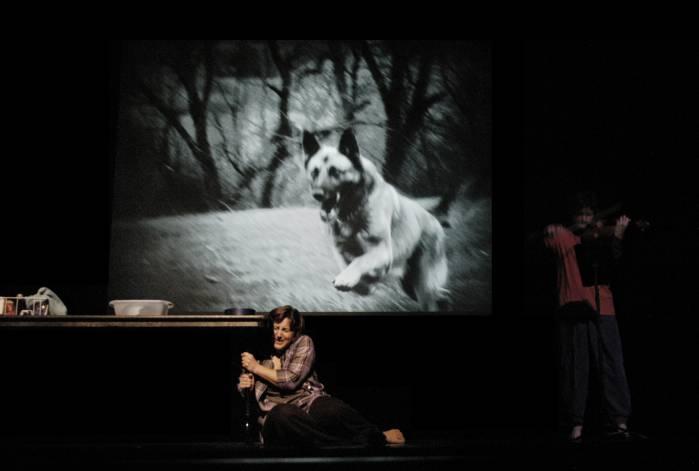A 70-minute song cycle for soprano and violin, the Kafka Fragments is the magnum opus (the irony of its miniature forms seems entirely deliberate) of György Kurtág, a composer known for the inscrutability of his music. His lines arrive at the ears fully armed, unwilling to surrender their meaning. A performance of the Fragments at the Tanglewood Music Festival in 2008 famously drove a musically literate audience from the room, so can Peter Sellars's staged interpretation really offer a more engaging experience? Up to a point.
The fragment: embodiment of an absent presence, encoding loss while aspiring perpetually toward a perfected whole. A Modernist touchstone, the fragment shifts on contact, sliding and deferring its meaning perpetually. Although composed in 1987, Kurtág’s work is rooted in the ideas of mid-century Modernism. Its 40 musical episodes hark back to the wilfully terse verses of Ezra Pound, the dense thematic patterning of The Waste Land, the aphoristic gestures of Webern. To stage this work is inevitably to fill in gaps, to supplement the very absences that define it. Enter Sellars, the director willing to give voice to its silences, to risk the discovery that they speak of nothing more than the weather.
Dawn Upshaw and Geoff Nuttall (leader of the St Lawrence String Quartet) take to the Barbican stage alone for the European premiere of the production. A full cast’s worth of prop tables line the sides, laden with household detritus and signalling the fluid, continuous relationship between the performing space and its “offstage” retreats. The relationship between singer and character is unclear, and in the silences that punctuate the precisely patterned rhythms of the work, we watch hopefully for signs of off-duty relaxation – a water bottle, a roll of the shoulders – to reassure us that we too can stop processing, can stop straining to understand.
Ranging from 10 seconds to about 10 minutes in length, the fragments themselves are a revelation. A musical vocabulary stretching from Webern-like concision to ghosts of the folk melodies of Mitteleuropa is startling in its breadth, even before you consider the orchestral range of textures drawn from just violin and voice. Both Upshaw and Nuttall share a distinctive communicative energy, an energy that is crucial to a production requiring each to synchronise emotion and physical gesture, not only with musical utterance but with each other, as well as with the series of images and texts projected behind them onto a giant screen.
 We open with a rhythmic plod that nods tersely in the direction of the wanderer-narrator of Schubert’s Winterreise. While lost in the fragmented episodes that follow, this rhythm permeates the whole: an exilic ritual to mirror those sacred and bodily practices suggested in Kafka’s texts and fulfilled in Sellars’s routines of household cleansing. There is an interiority to the music; its hard lines invite rather than assault, with moments of extroverted attack (the shrieks and howls of “Nichts dergleichen” or the painful anger of “Wiederum, wiederum”) claiming real attention from the ear, unwearied by musical wolf-crying. Despite occasional arrivals at tonal salvation – the perfect cadence closing Boulez-homage “Der wahre Weg" has the jarring effect of rhyming couplets desperately closing a Shakespeare tragedy – the music is largely occupied with a harmonic quest; its portamentos search with increasing urgency for a single harmonic point of resolution.
We open with a rhythmic plod that nods tersely in the direction of the wanderer-narrator of Schubert’s Winterreise. While lost in the fragmented episodes that follow, this rhythm permeates the whole: an exilic ritual to mirror those sacred and bodily practices suggested in Kafka’s texts and fulfilled in Sellars’s routines of household cleansing. There is an interiority to the music; its hard lines invite rather than assault, with moments of extroverted attack (the shrieks and howls of “Nichts dergleichen” or the painful anger of “Wiederum, wiederum”) claiming real attention from the ear, unwearied by musical wolf-crying. Despite occasional arrivals at tonal salvation – the perfect cadence closing Boulez-homage “Der wahre Weg" has the jarring effect of rhyming couplets desperately closing a Shakespeare tragedy – the music is largely occupied with a harmonic quest; its portamentos search with increasing urgency for a single harmonic point of resolution.
Framed by Sellars within the role of a housewife, Upshaw’s (pictured above right) singing becomes an expression and extension of household rituals. Dishes are laboriously scrubbed, clothes ironed, floors mopped, and yet among the banality there is both menace and absurdity. An iron becomes an instrument of self-torture, a pullover a beloved child; two bottles of washing-up liquid engage in an abortive (and charmingly witty) romance.
This grounding of the abstract in the everyday works fluently, supporting without hijacking Kafka’s gnomic texts. Had the production left it at this it would have sufficed. Its weakness lies in the images of David Michalek that dominate the projected backdrop. Literal to the point of wilfulness, their insistence in representing deserts when exile is spoken of, or dogs to accompany a fragment about a hunt, seems to miss the allusive point entirely.
Musically, this was an exceptional evening. Both Nuttall and Upshaw display a disarming simplicity when tackling Kurtág’s “borderline unplayable” lines. Upshaw’s palette of tone colours is vast, but more remarkable is her calculated deployment of each, shading even the most disjunct of phrases with narrative and emotional intent.
Fatally flawed but deeply satisfying, Sellars’s staging of the Kafka Fragments is something of a contradiction. In overplaying his hand and drawing the eye too reliably to order and meaning, the director alerts the audience to the beauty that escapes, the layers of allusion being missed. Kurtág’s skill in this glorious work is clearly affirmed, but at the expense of Sellars himself. It’s a sacrifice that, on the whole, seems worth making.
- See what's on at the Barbican this season
- Find Kafka Fragments on Amazon













Add comment